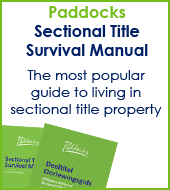By Jennifer Paddock
 In many sectional title schemes in South Africa, owners and tenants have tacit arrangements, generally established over long periods of time, in respect of who is “entitled” to park where. Many people really believe that a particular parking bay is “theirs”, although legally they have no greater right to use it than anyone else in the scheme.
In many sectional title schemes in South Africa, owners and tenants have tacit arrangements, generally established over long periods of time, in respect of who is “entitled” to park where. Many people really believe that a particular parking bay is “theirs”, although legally they have no greater right to use it than anyone else in the scheme.
Provided it is not a contentious issue, formalising the situation relating to parking bays in these schemes will be beneficial not only to the owners of sections – their sections will be more valuable because they can be sold with parking bays legally attached – but also to the body corporate, as it will legally be entitled to recover money from owners in relation to the costs it expends on the parking bays.There are only two ways in which a body corporate can create rights to exclusive use areas. The first is in terms of section 27 of the Sectional Titles Act 95 of 1986 (“the Act”) and is registered on the scheme’s sectional plan. The second is in terms of section 27A, which is created in terms of the scheme’s rules. The section 27 procedure is more expensive because the services of a land surveyor or architect must be employed, is time consuming and requires a unanimous resolution of the body corporate, which is often very difficult to obtain. The procedure in terms of section 27A, however, is much cheaper and easier as it does not require the services of a land surveyor or architect and only requires a special resolution of the body corporate if conduct rules are made.
Section 27A of the Act allows the body corporate to make rules, either management rules by unanimous resolution or conduct rules by special resolution, which confer rights of exclusive use and enjoyment of parts of the common property upon members of the body corporate. It also requires that the rules include a layout plan to scale which clearly indicates the locality of the distinctively numbered exclusive use areas, as well as the purpose for which the areas will be used and an allocation schedule detailing which owner will be entitled to use and enjoy each exclusive use area.
These two sections of the Act are the only ones that provide for the creation of exclusive use rights as that term is used in the Act. It is sometimes suggested that areas that are only accessible from one section and therefore are not ordinarily available for the use of other owners are “de facto” exclusive use areas. The concept of exclusive use, as it is used in the Act, depends on the existence of an agreement between owners, either under section 27 or section 27A. It is not possible to create exclusive use areas without an underlying agreement to this effect between owners and the Act gives specific directions as to the ways in which this agreement can be obtained and must be formalised.
Jennifer Paddock is a sectional title expert. Click here to see the schedule of training courses, or for free sectional title advice go to www.sto.co.za.
Article reference: Volume 5, Issue 6, Page 4
This article is published under the Creative Commons Attribution license.
Recent Posts
Recent Comments
- Graham Paddock on Body Corporate Functions: Insurance
- Graham Paddock on Spending body corporate funds
- Graham Paddock on The Levy Clearance Certificate: The Body Corporate’s Cheap & Effective Weapon
- Graham Paddock on The benefits of online sectional title meetings
- Heinz Wiesner on The benefits of online sectional title meetings
Archives
- July 2024
- June 2024
- May 2024
- April 2024
- March 2024
- February 2024
- January 2024
- December 2023
- November 2023
- October 2023
- September 2023
- August 2023
- July 2023
- June 2023
- May 2023
- April 2023
- March 2023
- February 2023
- January 2023
- December 2022
- November 2022
- October 2022
- September 2022
- August 2022
- July 2022
- June 2022
- May 2022
- April 2022
- March 2022
- February 2022
- January 2022
- December 2021
- November 2021
- October 2021
- September 2021
- August 2021
- July 2021
- June 2021
- May 2021
- April 2021
- March 2021
- February 2021
- January 2021
- December 2020
- November 2020
- October 2020
- September 2020
- August 2020
- July 2020
- June 2020
- May 2020
- April 2020
- March 2020
- February 2020
- January 2020
- December 2019
- November 2019
- October 2019
- September 2019
- August 2019
- July 2019
- June 2019
- May 2019
- April 2019
- March 2019
- February 2019
- January 2019
- December 2018
- November 2018
- October 2018
- September 2018
- August 2018
- July 2018
- June 2018
- May 2018
- April 2018
- March 2018
- February 2018
- January 2018
- December 2017
- November 2017
- October 2017
- September 2017
- August 2017
- July 2017
- June 2017
- May 2017
- April 2017
- March 2017
- February 2017
- January 2017
- December 2016
- November 2016
- October 2016
- September 2016
- August 2016
- July 2016
- June 2016
- May 2016
- April 2016
- March 2016
- February 2016
- January 2016
- December 2015
- November 2015
- October 2015
- September 2015
- August 2015
- July 2015
- June 2015
- May 2015
- April 2015
- March 2015
- February 2015
- January 2015
- December 2014
- November 2014
- October 2014
- September 2014
- August 2014
- July 2014
- June 2014
- May 2014
- April 2014
- March 2014
- February 2014
- January 2014
- December 2013
- November 2013
- October 2013
- September 2013
- August 2013
- July 2013
- June 2013
- May 2013
- April 2013
- March 2013
- February 2013
- January 2013
- December 2012
- November 2012
- October 2012
- September 2012
- August 2012
- July 2012
- June 2012
- May 2012
- April 2012
- March 2012
- February 2012
- January 2012
- December 2011
- November 2011
- October 2011
- September 2011
- August 2011
- July 2011
- June 2011
- May 2011
- April 2011
- March 2011
- February 2011
- January 2011
- December 2010
- November 2010
- October 2010
- September 2010
- August 2010
- July 2010
- June 2010
- May 2010
- April 2010
- March 2010
- February 2010
- January 2010
- December 2009
- November 2009
- October 2009
- September 2009
- August 2009
- July 2009
- June 2009
- March 2009
- February 2009
- February 2008
- February 2007

3 Comments.
[…] Ed note: Unless the sectional scheme’s registered plan provides exclusive use rights on a parking bay to a specific unit, you are merely “renting” the bay. If you are interested in legally linking parking bays to housing units, your body corporate will need to create rights to exclusive use areas. Find out how, here […]
My neighbour is servicing motor cars on his driveway for a living and the other neighbour does handy man work from his garage
Hi Jenny,
Thanks so much for your comment. Is this something you would like us to assist with? Please email consulting@paddocks.co.za, with the name of your scheme and a brief description of the issue at hand, and we’ll strive to get this resolved as soon as possible
Kind regards
Paddocks